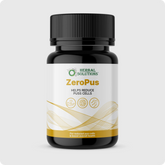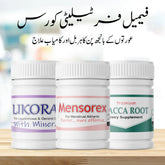7 Effective Herbal Solutions for PCOS Treatment in Pakistan: A Comprehensive Guide
What is Polycystic Ovary Syndrome (PCOS)?
Polycystic Ovary Syndrome (PCOS) is a complex hormonal disorder that affects approximately 8-13% of women of reproductive age worldwide. It is characterized by a combination of symptoms related to elevated androgen levels and ovarian dysfunction. PCOS is not just a reproductive issue but a metabolic disorder that can affect multiple systems in a woman's body, making it one of the most common yet often misunderstood endocrine disorders among women.
The name "polycystic ovary syndrome" refers to the numerous small cysts (fluid-filled sacs) that may form on the ovaries of women with this condition. However, not all women with PCOS have these cysts, and having ovarian cysts doesn't necessarily mean a woman has PCOS. The diagnosis is based on a broader spectrum of symptoms and clinical findings.
The Underlying Causes of PCOS
The exact cause of PCOS remains unknown, but several factors are believed to contribute to its development:
Hormonal Imbalances
PCOS is primarily characterized by three key hormonal imbalances:
- Elevated Androgens: Women with PCOS produce higher-than-normal amounts of androgens (male hormones), leading to symptoms like excess facial and body hair, acne, and male-pattern baldness.
- Insulin Resistance: About 70% of women with PCOS have insulin resistance, meaning their cells cannot use insulin effectively. This causes the pancreas to produce more insulin, which in turn stimulates the ovaries to produce more androgens.
- Low-Grade Inflammation: Women with PCOS often have low-grade inflammation throughout the body, which can stimulate the ovaries to produce more androgens.
Genetic Factors
PCOS tends to run in families, suggesting a genetic component:
- Women with a mother or sister who has PCOS are at higher risk of developing the condition
- Research has identified several genes that might be linked to PCOS
- The genetic component appears to interact with environmental factors
Environmental Influences
Several environmental factors may contribute to PCOS:
- Poor diet high in refined carbohydrates
- Sedentary lifestyle
- Environmental toxins and endocrine disruptors
- Chronic stress
- Obesity (though it's important to note that not all women with PCOS are overweight)
Comprehensive Symptoms of PCOS
PCOS manifests through a wide range of symptoms that can vary significantly among affected women:
Reproductive Symptoms
- Irregular menstrual cycles: Infrequent, prolonged, or unpredictable menstrual periods are often the most common symptom
- Anovulation: Lack of ovulation, which can lead to fertility issues
- Polycystic ovaries: Multiple small cysts on one or both ovaries, visible through ultrasound
- Difficulty conceiving: Due to irregular ovulation or anovulation
Androgenic Symptoms
- Hirsutism: Excess hair growth on the face, chest, back, or other areas typically associated with male hair growth patterns
- Acne: Particularly on the face, chest, and upper back
- Male-pattern baldness: Hair thinning or loss on the scalp
- Darkening of the skin: Particularly in neck creases, groin, and underneath breasts
Metabolic Symptoms
- Weight gain or difficulty losing weight: Especially around the abdomen
- Insulin resistance: Which can lead to intense cravings, particularly for carbohydrates
- Fatigue: Often related to hormonal imbalances and insulin resistance
- Sleep disturbances: Including sleep apnea, which is more common in women with PCOS
Psychological Symptoms
- Mood swings: Including depression and anxiety
- Low self-esteem: Often related to physical symptoms and body image
- Stress: Both as a contributing factor and as a result of dealing with PCOS symptoms
- Eating disorders: Some women may develop disordered eating in response to weight-related symptoms
Long-Term Health Risks Associated with PCOS
If left unmanaged, PCOS can lead to several serious health complications:
Reproductive Complications
- Infertility: Due to irregular or absent ovulation
- Pregnancy complications: Including gestational diabetes, preeclampsia, and premature birth
- Endometrial cancer: Due to prolonged exposure to estrogen without the balancing effects of progesterone
Metabolic Complications
- Type 2 diabetes: Women with PCOS have a significantly higher risk of developing type 2 diabetes earlier in life
- Cardiovascular disease: Increased risk due to higher levels of LDL cholesterol, lower levels of HDL cholesterol, and higher triglycerides
- Hypertension: Higher risk of developing high blood pressure
- Nonalcoholic fatty liver disease: Fat accumulation in the liver not caused by alcohol consumption
Psychological Complications
- Clinical depression: Women with PCOS are more likely to experience depression
- Anxiety disorders: Including social anxiety often related to physical symptoms
- Poor quality of life: Due to chronic symptom management and health concerns
Conventional Diagnosis and Treatment Approaches
Diagnostic Criteria
The Rotterdam criteria are commonly used to diagnose PCOS, requiring two out of the following three features:
- Oligo/anovulation (irregular or absent ovulation)
- Clinical and/or biochemical signs of hyperandrogenism (elevated androgens)
- Polycystic ovaries on ultrasound
Conventional Medical Treatments
Conventional treatments for PCOS typically include:
- Hormonal birth control: To regulate menstrual cycles and reduce androgen levels
- Anti-androgen medications: To address hirsutism and acne
- Metformin: To improve insulin sensitivity
- Clomiphene or letrozole: To induce ovulation in women trying to conceive
- Surgery: Ovarian drilling is sometimes used to trigger ovulation in cases resistant to medication
While these treatments can be effective for symptom management, they often don't address the root causes of PCOS and can come with unwanted side effects.
Natural and Holistic Approaches to PCOS Management
Dietary Modifications
- Low-glycemic index diet: Focusing on foods that don't cause rapid spikes in blood sugar
- Anti-inflammatory foods: Incorporating foods rich in omega-3 fatty acids, antioxidants, and fiber
- Balanced meals: Including protein, healthy fats, and complex carbohydrates in appropriate portions
- Minimizing processed foods, refined sugars, and artificial additives: Which can worsen inflammation and hormonal imbalances
Lifestyle Changes
- Regular physical activity: Both cardio and strength training can improve insulin sensitivity and hormone balance
- Stress management: Techniques like yoga, meditation, and deep breathing exercises
- Adequate sleep: Prioritizing 7-9 hours of quality sleep per night
- Reducing exposure to endocrine disruptors: Choosing natural personal care and household products
Herbal and Nutritional Supplements
Several natural supplements have shown promise in managing PCOS symptoms:
- Inositol: Helps improve insulin sensitivity and ovulation
- N-acetylcysteine (NAC): Can improve insulin sensitivity and reduce inflammation
- Vitamin D: Many women with PCOS are deficient, and supplementation may help improve symptoms
- Omega-3 fatty acids: Help reduce inflammation and may improve hormone balance
- Berberine: Has effects similar to metformin in improving insulin sensitivity
- Spearmint tea: May help reduce androgen levels
- Cinnamon: May help improve insulin sensitivity
The Female Fertility Course: A Comprehensive Approach to PCOS Management
For women seeking a holistic, natural approach to managing PCOS and improving fertility, the Female Fertility Course offers a comprehensive program specifically designed to address the root causes of PCOS.
What the Course Offers
The Female Fertility Course takes an integrative approach to PCOS management, combining:
- Personalized Nutritional Guidance: Customized dietary recommendations based on traditional wisdom and modern nutritional science to balance hormones naturally and improve insulin sensitivity.
- Herbal Protocols: Safe, effective herbal formulations that have been used traditionally to support female reproductive health, regulate menstrual cycles, and reduce androgen levels.
- Lifestyle Modifications: Evidence-based lifestyle practices that address the multifaceted nature of PCOS, focusing on stress reduction, sleep quality, and appropriate physical activity.
- Mind-Body Practices: Techniques to address the psychological aspects of PCOS, helping women cope with the emotional impact of the condition while also positively influencing hormonal balance.
- Fertility Support: For women trying to conceive, specific protocols to enhance ovulation and create an optimal environment for conception.
Benefits of a Holistic Approach
Unlike conventional treatments that often focus solely on symptom management, this holistic approach works to:
- Address the root causes of hormonal imbalances
- Improve overall health and wellbeing, not just reproductive symptoms
- Reduce dependency on medications and their potential side effects
- Empower women with knowledge about their bodies and natural health options
- Create sustainable lifestyle changes that benefit long-term health
Success Stories
Many women who have completed the Female Fertility Course report:
- Regularization of menstrual cycles
- Reduction in insulin resistance markers
- Improvement in skin and hair symptoms
- Weight management success
- Successful conception after struggling with fertility
- Enhanced energy levels and mood
- Overall improvement in quality of life
Conclusion: A Personalized Approach to PCOS Management
PCOS is a complex condition that affects each woman differently. While conventional medical treatments have their place, especially in managing severe symptoms, a holistic approach that addresses the underlying causes of hormonal imbalances offers hope for many women seeking natural solutions.
The Female Fertility Course provides a structured yet personalized pathway for women with PCOS to reclaim their hormonal health and fertility naturally. By combining ancient wisdom with modern understanding of women's health, this course empowers women to take control of their PCOS journey and work toward lasting health and wellness.








